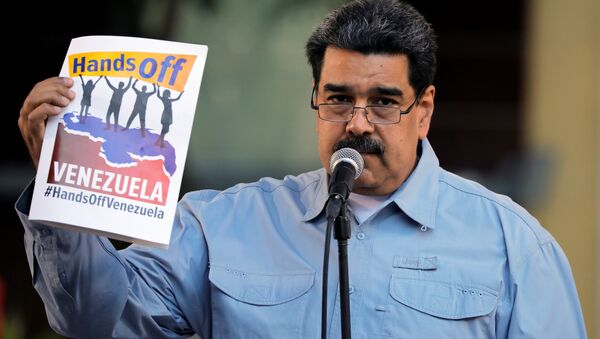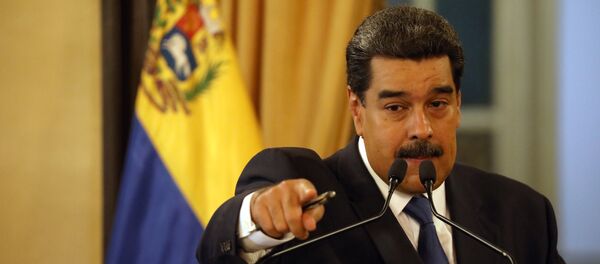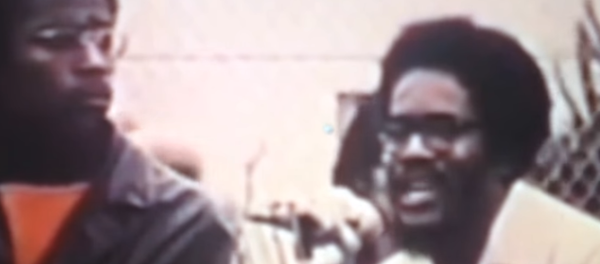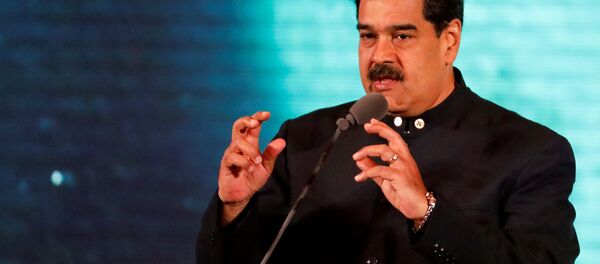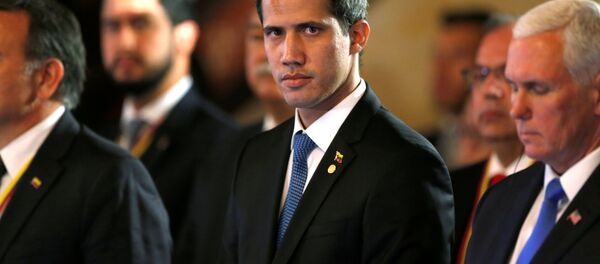While the US continues to economically and politically undermine the democratically elected government of Venezuelan President Nicolas Maduro, Washington's propaganda war is having little effect in the country, Anya Parampil, a Washington-based journalist for the Grayzone Project, told Radio Sputnik's Loud and Clear Tuesday. She said the real audience for the Trump administration's policies is here in the US, where the popularity of socialism is on the rise, and the danger of a good example in Venezuela's socialist project is something that must be eliminated.
During his State of the Union Address last month, US President Donald Trump promised "America will never be a socialist country." A Gallup poll conducted last August found that 51 percent of Americans between the ages of 18 and 29 and 41 percent between the ages of 30 and 49 have a positive view of socialism. The largest socialist organization in the country, the Democratic Socialists of America (DSA), claims its membership has ballooned since the 2016 election to 60,000, The Hill reported last week, and "socialism" was the most-searched word on Merriam-Webster's online dictionary in 2015, the Guardian reported at the time.
This is a pretty big development regarding public opinion on socialism and capitalism in the Democratic Party. pic.twitter.com/hUTBVPoAYC
— Waleed Shahid (@_waleedshahid) March 1, 2019
Parampil returned to the US on Sunday after spending several weeks reporting on the ground in the Venezuelan capital of Caracas, where she interviewed everyday Venezuelans and investigated many of the claims made by the US media, such as that grocery stores are empty and that people are starving. She found neither of these things — nor did she find a compliant public, willing to accept Washington's anointed Interim President of Venezuela Juan Guaido, who returned to the country on Monday promising to lead a movement against Maduro.
It is "unbelievable" that someone could claim that "nobody knows for sure who the real president of Venezuela is at the moment," as a Monday opinion piece in the New York Times brazenly declared, she said.
"I was on the ground in Caracas for three weeks and… even among the opposition, there's no belief, currently, that Juan Guaido is president. They believe the United States is trying to help him become president, and they're confident that can happen on the opposition side, but there's not any question of who's currently governing Venezuela at the moment. Juan Guaido has no address where he could even claim to be governing from; it's all quite a bit absurd. The government has stayed strong and there have been pro-government rallies all across the country in recent weeks. Millions of people have taken to the streets that they still stand with the democratically elected government of Maduro," she said.
Parampil told hosts Brian Becker and John Kiriakou that "Guaido and [US Senator] Marco Rubio and [US National Security Adviser] John Bolton, President Trump: they're all running what feels like a social media coup, a reality show coup. A Twitter campaign, really, is what it seems like, because there's no effect on the ground; there is just none."
The extent to which this group of US statesmen is forwarding such a narrative was on display in Tuesday tweets by Rubio complaining that CNN and the Washington Post had referred to Guaido as "opposition leader" and "self-proclaimed president."
"You know things aren't working well for your US-backed coup if even CNN isn't recognizing Juan Guaido as president," Parampil told Sputnik.
"It's been very absurd to watch the way the media continues to make the point that, because of the suffering of the Venezuelan people, they're going to just open their arms and accept Guaido. Everybody I spoke to there has a very complex understanding as to why they're suffering economically," Parampil said.
"There's not a humanitarian crisis in the country the way that we're hearing in the mainstream media; there's an economic crisis. The buying power of Venezuelans has been hurt: there's no price controls, it's hard for them to buy some basic goods, so they are still receiving support from the government, delivery of food staples every month… They understand that US sanctions and a US-led economic war is the root of their problem, so they're not going to accept the US solution to that, and it might be really hard for people in Washington and for US-based journalists to accept that. But you know, all you have to do is go to Caracas and show up and talk to regular people on the street, and it becomes very clear," the journalist said.
Parampil said the propaganda war was driving the Trump administration's policy toward Venezuela.
"We don't want to rule anything out, because with the people that are around President Trump right now, like [National Security Adviser] John Bolton, [US Envoy to Venezuela] Elliott Abrams, and President Trump himself, anything is possible. We can't pretend as though military intervention or further violent action against Venezuela can be ruled out," she said.
"At the same time, the honest sense that I get is that this is a media war — not just in the sense that what happened on the 23rd of February on the border with Colombia was an event essentially staged to get media attention and to try and create the justification for further intervention. It didn't happen."
"But even if you paid attention to Trump's speech in Florida where he was supposed to be talking about the situation in Venezuela, it was mostly a speech ranting against socialism and socialist policies," Parampil noted. "That may have more to do with domestic politics than Venezuela itself, and I get the feeling that the Trump administration would like a prolonged battle against the Venezuelan state, where they can point to it because of the US-led economic war and sanctions that have weakened the country and say, ‘Look how socialism's failed, you don't want that here.'"
"That's what makes me think further military action may not happen in the immediate future: because the longer Venezuela stays around, the longer the Trump administration and the leaders in the United States can point to it as a failure of socialism when, you know, people who follow the situation or talk to the people there say the fact that Venezuela's actually withstood US sabotage for this long is actually a testament to its strength," Parampil said.
But Trump isn't the only one who might be trying to milk the international situation for domestic political points, she said.
"Rubio, obviously, is appealing to right-wing Cubans and Venezuelans in Florida. But there is also a generation of younger Cubans who are more progressive and more supporting [former US President Barack] Obama's efforts to open up to Cuba and Latin America. Now, Rubio is attempting to rally the base back behind his right-wing, aggressive stance on Venezuela," Parampil said. "Even though he was so humiliated by Trump during the Republican debate process, he's now willing to go be Trump's errand-boy on the Venezuelan border. But he, again, seems to be totally failing."
Indeed, both in and out of Congress, opposition in the US has been mounting against the US coup attempt in Venezuela. A number of progressive Democratic lawmakers have issued statements denouncing or disapproving of the effort, and opposition groups in the US have rallied against the coup as well as the sanctions against Venezuela and are planning a large protest march on March 16 in Washington, DC.
